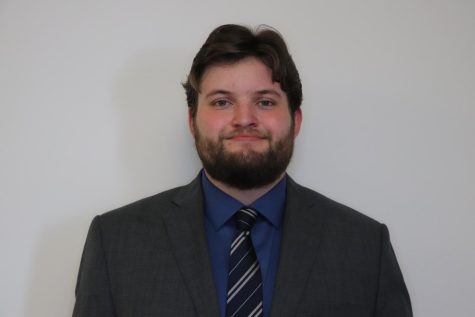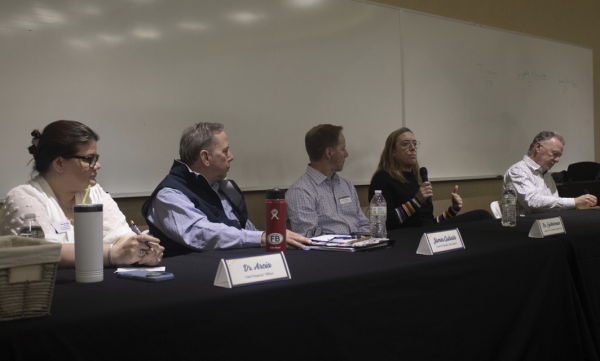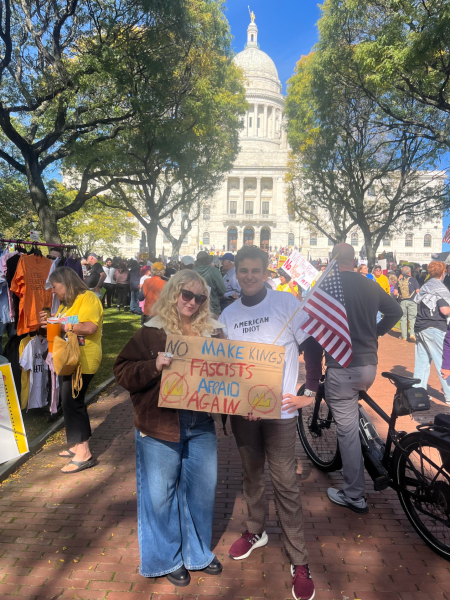A discussion on interculturality and indigenous peoples in Ecuador
Roger Williams University welcomed Daniel Bryan, the director and co-founder of Pachaysana, an Ecuadorian non-profit dedicated to intercultural education on Thursday Oct. 13. While born in the United States, Bryan has lived in Ecuador for the last 22 years where he works closely with indigenous communities. Bryan spoke about several topics including epistemic justice, reimagining education and combining it all through the arts.
The presentation opened with a guided land acknowledgment where Bryan invited RWU Professor of Journalism, Dr. Paola Prado, to read out the official RWU Land acknowledgment and then explained why it is important to have such conversations.
“The land acknowledgment doesn’t just recognize, in words, the presence of ancestral peoples in the past, but their presence here, now,” said Bryan. “They literally are us because they were buried, their bodies turned into earth, which turns into food, which nourishes our body and keeps us alive.”
Following this, a song titled “Semillita” was played which led to Bryan’s next topic on indigenous uprisings and protests not just in Ecuador, but around the world and how those have acted as somewhat of a land acknowledgment themselves.
Two of the major uprisings in Ecuador occurred in 2019 and 2022 when indigenous people were protesting austerity measures and subsidies that affected them the most. Bryan went on to talk about examples of hip-hop artists and rappers using their medium as a way to join and encourage others to join the protests.
Bryan also spoke on the differences in how climate change is taught from a western perspective and from an indigenous perspective. He explained that the western point of view looks at climate change through an academic and statistical approach while the indigenous view looks at it from a grounded, human perspective where it is the fading of the connection between people and the Earth. Bryan discussed the process of trying to bridge these two concepts together.
“We have worked with indigenous knowledge holders and scholars to try and see that knowledge both through the academic lens and through the grounded, local lens as well and try to bridge those together,” said Bryan.
On the topic of education at the university level, Bryan explained the significance that colleges can have in helping their students acknowledge certain inherent biases and how to best deal with and “unlearn” them.
“We don’t see universities as this kind of ivory tower, we see them just part of a pluriversity,” said Bryan. “We want to reimagine education as a collective creation to foster liberation and to unlearn systemic and embodied injustices.”
Bryan proposed that universities, rather than bring students of different cultures into the existing curriculum, should change the curriculum to allow everyone’s background to be explored and recognized.
“The way we usually look at inclusion is epistemic violence because what we’re usually saying inclusion is, we’re going to take diverse students and include them into this existing system that doesn’t work for them,” said Bryan. “We should be including ourselves in different points of view. We should be moving ourselves to the margins.”
Bryan closed out his presentation by reading off “La Ley Suprema de Pachamama” which translates to “The Supreme Law of Pachamama,” part of which states “We are nothing more and nothing less than the Earth because we are Earth. We are nothing more and nothing less than the air because we are air. We are nothing more and nothing less than the fire because we are fire.”

Sam Elwell is the Managing Editor for The Hawks' Herald who has also served as the Opinions Editor (2021-2022) as well as a staff writer (2020...





